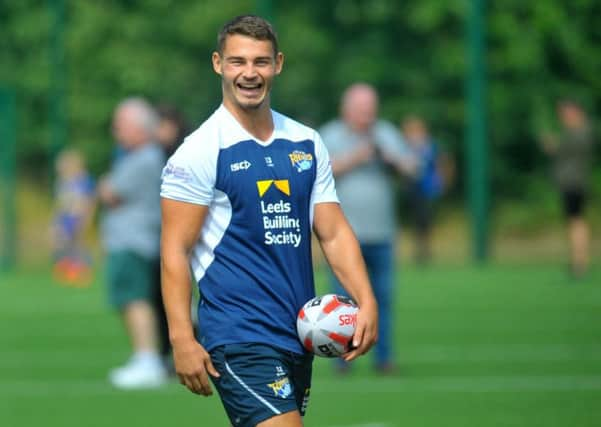Concussion protocal: Leeds Rhinos forward Stevie Ward put to test by head woes


However, the talented England hopeful admits his latest setback has been altogether different – as it is actually centred on his head.
Leeds Rhinos back-row Ward concedes he struggled to cope with being sidelined for almost a month due to concussion and, as much as he missed being in action, revealed he had to be brutally honest about his symptoms.
Advertisement
Hide AdAdvertisement
Hide AdThe 24-year-old is set to make his comeback when Rhinos head to London Broncos in Sunday’s Qualifiers game, but only having eventually passed all the ‘Graduated Return To Play’ protocols.
In the modern game far more emphasis is placed on carefully managing a player’s recovery from concussions as understanding of both its short-term and long-term effects improves.
Certainly long gone are the days where someone could be knocked out on the pitch and return later in the very same game.
Strict protocols are now in place and it can be weeks before a player is deemed ready to feature once more.
Advertisement
Hide AdAdvertisement
Hide AdWard told The Yorkshire Post: “It’s changed a lot. I’ve seen a neurologist two or three times now.
“That happens whenever you’ve had two concussions inside 12 months.
“I’m very resistant to being injured and that’s something I have to take hold of. But you’ve got to be honest with them as otherwise you find yourself knocked again and starting back at the start.
“You have to treat it as an important thing and it is one of the hardest things I’ve had to deal with. I’ve missed three games because of it.
Advertisement
Hide AdAdvertisement
Hide Ad“I’ve been used to using my head to deal with injuries as my career goes on. But when it’s your head that’s injured that’s another task completely.
“It muddles you up and you don’t feel like yourself. And the things that make you feel better – like training and exercising – initially you can’t do any of those.”
Ward has spoken before about battling depression, and set up an online magazine Mantality as a way of getting people to speak about anxiety, self-doubt and related issues.
The Yorkshireman, who has won two Grand Finals and two Challenge Cups with Leeds, gave an insight into just what a player needs to achieve to get the green light for that playing return.
Advertisement
Hide AdAdvertisement
Hide Ad“Let’s say you suffer a knock on a Friday night, you’ll do a SCAT (Sport Competition Anxiety Test) during the game,” he said.
“That’s remembering words, the date and remembering numbers they tell you. You might have to do them backwards. The doc’ then assesses whether you can go back on the pitch or not. On the Monday, you’ll check back in with the doc’ for how you are feeling.
“If you do feel fine then you do a graduated return. It might be 20 minutes on a bike Tuesday, skills or light running on a Wednesday, then contact Thursday before it’s decided if you can play on Friday.
“If you get a headache or feel dizzy or have any of the concussion symptoms at any point you have to start it all again.”
Advertisement
Hide AdAdvertisement
Hide AdWard suffered a concussion in the game against Huddersfield on June 8.
He explained: “I went to see the neurologist and on that test I was 70 percent down on what I was last year when I did it.
“So obviously that ruled me out for two weeks. I came back against Castleford but it was the training session before the Wakefield game when I clattered into Garbs (Mitch Garbutt).
“That brought the symptoms back – cloudy, not feeling like myself, headaches, like you’re living in a fog, getting agitated...
Advertisement
Hide AdAdvertisement
Hide Ad“The hardest thing is that when you’re in it you’re having to judge things in a factual way.
“Obviously you’re wanting to play and it’s a hard thing to get out. It’s a bit like sticky mud.
“You have to tell them your symptoms. If you get a knock in training you shouldn’t be playing but I did play the next day against Wakefield and then had the symptoms again really bad. I realised then that I had to get right.”
Ironically, when he did, Ward then missed Saturday’s win over Toulouse due to illness.
Advertisement
Hide AdAdvertisement
Hide AdHe admitted: “That was such a pain. I was so excited to be playing and then felt absolutely shocking.
“But after everything that had happened with my head, Kev (Sinfield) just said to get myself right for London.
“I can’t wait now. It’s a big challenge which is just what we need.”